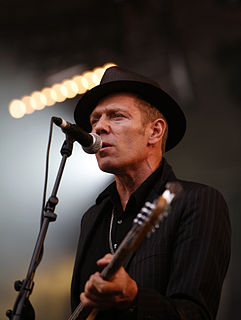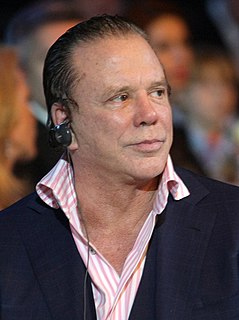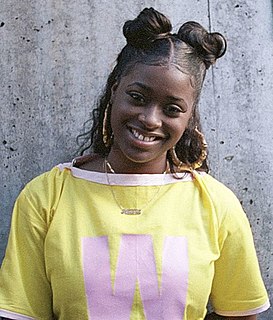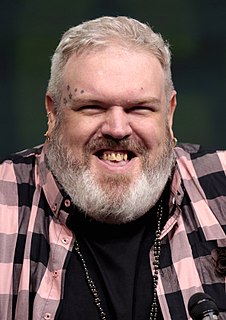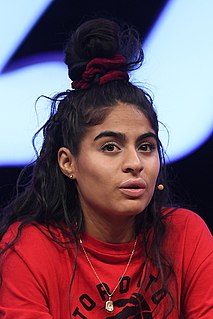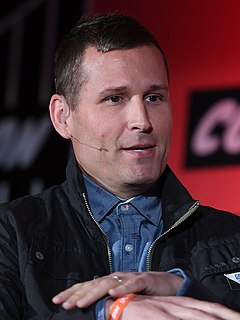A Quote by Paul Simonon
When I first saw The Black Kat Boppers I was sat on a hill at a festival and could hear this music in a tent that literally grabbed me by the lapels and dragged me in
Related Quotes
Adults who loved and knew me, on many occasions sat me down and told me that I was black. As you could imagine, this had a profound impact on me and soon became my truth. Every friend I had was black; my girlfriends were black. I was seen as black, treated as black, and endured constant overt racism as a young black teenager.
Summerset, don't you ever sleep?" "It's Lieutenant Dallas. She's--" Roarke dropped his briefcase, grabbed Summerset by the lapels. "Has she been hurt? Where is she?" "A nightmare. She was screaming." Summerset lost his usual composure and dragged a hand over his hair. "She won't cooperate. I was about to call your doctor. I left her in her private suite." As Roarke pushed him aside, Summerset grabbed his arm. "Roarke, you should have told me what had been done to her." Roarke merely shook his head and kept going. "I'll take care of her.
I see a few hands stretching out to me at the edge of the net, so I grabbed the first one I could reach and pull myself across. I roll off, and would have fallen face-first onto a wood floor if he had not caught me. "He" is the young man attached to the hand I grabbed. He has a spare upper lip and a full lower lip. His eyes are so deep-set that his eyelashes touch the skin under his eyebrows, and they are dark blue, a dreaming, sleeping, waiting color.
Gabrielle, Hale?" Kat smacked his shoulder. "It wasn't bad enough that you got me kicked out of school, but you had to use her to help you? Gabrielle!" "I can hear you," her cousin sang beside her. Hale looked at Gabrielle and gestured at Kat. "She's adorable when she's jealous." Kat kicked his shin.
I was about 16 years old years when my father took me to a square dance festival in North Carolina. For the first time in my life, I found there was music in my country that you never heard on the radio, and you didn't hear on the juke boxes, and in theaters. I fell in love with it, especially the long-necked banjos.
Like for 'Black Nails,' I just had black nails - and I never have black nails. It was my first and last time getting black nails. And that's so not normal for me. So when you're recording, you're up at the mic and you gotta name the file, so I just look down and I'm like, 'Black Nails!' That's literally what it was.
I did a music festival in France. I'm not going to name names, but there were bigger bands and DJs on before me, and throughout their set, all I could hear them chanting was 'Hodor!' And I was, like, 'Oh, please stop! It's so disrespectful to the other acts!' In a way, obviously, I loved it, but it was kind of embarrassing at the same time.
I thought, 'Maybe if I become a cheerleader, I can meet managers or agents. Maybe I can sing the national anthem at a game, and someone in the industry will hear me.' I saw everything as an opportunity to further my music. I was literally the cheerleader who had a mixtape in between her pom-poms at events.
I remember thinking as I was doing the jokes for the first time, "If I can hear that very clearly, I'm not hearing laughter." It just became deafening, this buzzing noise. I mean, it was brutal. It was really terrible. Then I remember thinking, "At least nobody important, or anyone who I really respect, saw that." And then literally right when I went off the stage, Jerry Seinfeld got up and went on. So I was like, "Oh great. Seinfeld saw me bomb." On the other hand, I thought, "At least no one will be thinking of me anymore. They'll just be focusing on him."
I knew it straight away when Twitter first came around, and also Facebook, where it was so easy to post, that this was another way to speak directly with people listening to my music. If they found my music and they like it, most likely they want to hear more from me and hear what I'm about. I've put an enormous amount of time into that and it's played out well for me.
'Crash' came from personal experience. I saw things inside me from living in L.A. that made me uncomfortable. I saw horrible things in people and saw terrible things in myself. I saw a black director completely humiliated, but the three people around me just thought it was funny. 'No,' I said, 'that is selling your soul.'
